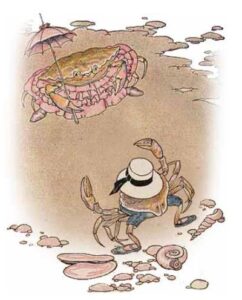There was once an old crab who lived in the sea. The crab always never used to appreciate anyone. She would always say:
TranslateEs gab einmal eine alte Krabbe, die im Meer lebte. Die Krabbe hat nie jemanden geschätzt. Sie würde immer sagen:
“Tsk. Tsk. You are cooking wrongly. You should have added more salt.”
“Tsk. Tsk. You are eating wrongly. You should move your teeth from left to right.”
Translate“Tsk. Tsk. Du kochst falsch. Du hättest mehr Salz hinzufügen sollen. “
“Tsk. Tsk. Du isst falsch. Du solltest deine Zähne von links nach rechts bewegen. “

“Tsk. Tsk. You are jumping wrong. You should jump straight.”
“Tsk. Tsk. You are singing wrong. You should sing in a lower tone.”
Translate“Tsk. Tsk. Du springst falsch. Du solltest geradeaus springen. “
“Tsk. Tsk. Du singst falsch. Du solltest in einem tieferen Ton singen. “
Whatever the other crabs did, she would criticize. The younger crabs used to avoid her. One day she saw a young crab walking sideways, like all crabs walk normally. She called him and said:
TranslateWas auch immer die anderen Krabben taten, sie würde kritisieren. Die jüngeren Krabben mieden sie. Eines Tages sah sie eine junge Krabbe, die seitwärts ging, wie alle Krabben normalerweise gehen. Sie rief ihn an und sagte:
“TSk. Tsk. You should not walk sideways. You should only walk straight.”
Translate“TSk. Tsk. Du solltest nicht seitwärts gehen. Du solltest nur geradeaus gehen. “
The young crab said, “Can you please show me Grandmother Crab about how I should walk? I can learn from you then.”
TranslateDie junge Krabbe sagte: „Kannst du mir bitte zeigen, Großmutter Krabbe, wie ich laufen soll? Dann kann ich von dir lernen. “
The old crab tried and tried to walk straight but she could only move sidewards. She tried so hard that she fell down and hurt her nose.
TranslateDie alte Krabbe versuchte und versuchte, gerade zu gehen, aber sie konnte sich nur seitwärts bewegen. Sie versuchte es so sehr, dass sie hinfiel und sich die Nase verletzte.
The young crab said, “Thank you Grandmother for showing me how to fall.”
TranslateDie junge Krabbe sagte: “Danke, Großmutter, dass du mir gezeigt hast, wie man fällt.”
Hope you had fun learning German through short stories 🙂 If so leave a comment!!!
For more languages:
Learn German through Short stories: https://childhood-stories.com/German
Learn Spanish through Short stories: https://childhood-stories.com/Spanish
Learn Italian through Short stories: https://childhood-stories.com/Italian
Learn Dutch through Short stories: https://childhood-stories.com/Dutch
Learn French through Short stories: https://childhood-stories.com/French
Learn Portuguese through Short stories: https://childhood-stories.com/Portuguese
Learn Portuguese through Short stories: https://childhood-stories.com/English
About: Studying through Dual Language immersion is among the best techniques for learning a new language. The objective of this website is to teach yourself how to read and speak German confidently using English as a base 🙂 These German short stories are super cool to read for beginners and also for entertaining children. Aesop’s Fables are among the best stories that can be studied on a daily basis.
About the Editor
The author of this German dual language short story is a C1 Goethe certified German language expert. He has over 5 years’ experience in teaching German and over 8 years learning.
He has conducted over 1000 plus hours of classes to over 300 students. In simple words (his words as well as his student’s words), he is AWESOME!!! He can be reached out to at deindeutschlehrer24@gmail.com
He also provides German Language courses for A1, A2 and B1 levels. Below are the details for the same:
Fees for A1, A2 and B1 levels are 120€,140€ and 160€ respectively.

